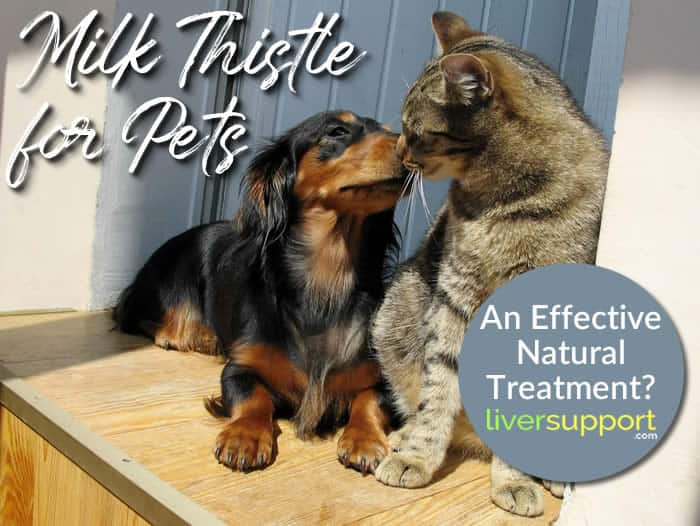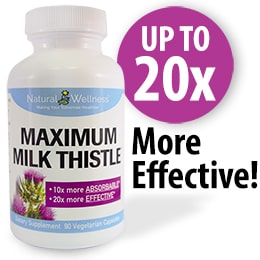
Previous
Milk Thistle Dosage: How Much Should You Take?

Next
How Long Does It Take for Milk Thistle to Work?
Milk Thistle for Pets: An Effective Natural Treatment?
Is milk thistle an effective natural treatment for your pets? Find out if milk thistle can benefit your cats and dogs.
This article takes an in-depth look at milk thistle and its role in effectively treating your pets.
What Is Milk Thistle?
Milk thistle is a flower in the Aster family used medicinally for over 2,000 years. Practitioners use milk thistle to support liver detoxification functions and various organs such as the stomach, gastrointestinal tract and kidneys. It is also used for liver disease, congestion of the liver, spleen or gallbladder, varicose veins, uterine hemorrhage, allergies, and as an adjunctive cancer therapy.
The active ingredient in milk thistle is silymarin, an ingredient recently advocated for pets, because the benefits that have been examined in humans have also proven beneficial for pets (1).
- dogs
- cats
- horses
- goats
- ferrets
- and rodents to aide in recovery from toxic loads and disease (1).
Pets are not unlike humans in that they must detoxify the exposure to toxins on a daily basis, and the toxins they face are often more frequent than we think as they must contend with potentially contaminated food, routine antibiotic use, viruses, and illnesses specific to their breed.
What Are the Functions of Milk Thistle?
Veterinarians and pet practitioners use milk thistle in pets to support liver toxic insult, inflammatory disorders, and cirrhosis. Milk thistle may also be appropriate in treatment of ketosis in cattle.
Silymarin from milk thistle has the following functions:
- Antioxidant
- Inhibitor of cell damage to liver membranes
- Protectant against DNA damage
- Stimulator of protein production by liver cells
- Protector of glutathione destruction (glutathione is crucial to normal liver functioning)
- Stabilizer of mast cell functions (when these cells degranulate as from a tumor, animals can have a shock reaction)
- Decreases activity of tumor promoters
What Are the Conditions Milk Thistle Often Treats?
Below are 7 conditions where milk thistle has been proven to help your pets.
- Diabetes: The silymarin in milk thistle has been shown to decrease blood sugar and hemoglobin A1C (1, 2). Pets suffering from diabetes are often given milk thistle at least once per week. This decreases the amount of insulin they need daily (1). The insulin sensitizers come from a family of compounds called flavonolignans (2). Silymarin acts as an inhibitor of aldose reductase enzyme, thus interfering with accumulation of sorbitol which accumulates in the presence of high blood sugar and promotes diabetic complications. Silymarin is potent agent against insulin resistance and diabetes-induced high blood sugar.
- Liver: Milk thistle acts as a liver protectant. It is especially beneficial in animals recovering from parvovirus, inoculations, frequent antibiotic use, exposure to contaminants such as aflatoxin in contaminated commercial food (3), jaundice (4), toxic byproducts of pharmaceutical drugs and many newer liver diseases coming to scientific light (5). It also helps with hepatic lipidosis (replacement of healthy liver cells with fat) and chronic hepatitis.
- Kidneys: Studies have shown silymarin in milk thistle decreases nephrotoxicity in dogs, thus exerting a protective effect on the kidneys (6). It has also been shown to reduce kidney toxicity from chemotherapeutic drugs.
- Pancreatitis: While pancreatitis is not common in cats, dogs frequently suffer from it. Milk thistle can be given to your pet to alleviate symptoms of the disease.
- Cancer: Milk thistle has been shown to decrease the effects of cancer on your pet’s body.
- Gastrointestinal: Milk thistle can be used for treatment of inflammation of the bile ducts and inflammation of the tissue surrounding the bile ducts. Many dogs with inflammatory bowel disease are treated with milk thistle (7).
- Allergies: Milk thistle helps alleviate epidermal and other signs of allergy due to high histamine levels (1).
Cats

Milk thistle has been used to treat jaundice in cats (4). It can be used to aid the liver in recovery from kidney damage, hepatitis, leptospirosis and parvovirus recovery.
Milk thistle may also help the allergic cat. Since the liver produces histamine (an allergic reaction) when it is flooded with toxins, milk thistle can help decrease the histamines, thereby subduing the allergic response.
Milk thistle has proven to be useful in acetaminophen toxicity in cats whose well-meaning owners have dosed them with the drug for their aches and pains (8).
Supplements given to cats should not be extracted from alcohol as an alcohol-based tincture is unacceptable in taste, and buying products specifically for cats or pets in general is preferable.
Dogs

Liver disease is more predominant in some breeds of dogs as opposed to others. For example, Labrador Retrievers, Dalmatians and Great Danes are more susceptible to liver disease due to their problems with metabolizing and excreting copper (1).
New and emerging liver diseases are being studied and treated with silymarin from milk thistle. Its role as an antioxidant is beneficial in preserving liver function and restoring normalcy. Several new hepatobiliary diseases have come to light where silymarin has become part of the integral supportive therapy (5). Liver support therapy including milk thistle has shown improvements in liver oxidative status through increased glutathione concentrations.
Cain terriers, Yorkshire terriers and Maltese are typical breeds of dogs that may show no outward clinical signs of liver disease but have elevated liver enzymes which may lead to portal hypertension over time. Some suggest supportive milk thistle therapy for this condition (5).
Research has shown dogs with ascites (the accumulation of fluid in the peritoneal cavity) treated with silymarin along with supportive therapy were able to attain normal activities after 45 days of therapy indicating the effectiveness of silymarin on hepatic dysfunction (9). Ascites is most often caused by liver scarring such as in cirrhosis.
Treatment with milk thistle may also be indicated for dogs on steroids, heartworm prevention, or anti-inflammatory medication as well as an adjunct to chemotherapy (10).
Many dogs with irritable bowel disease (IBD) have concurrent inflammation of the liver/bile/pancreas system called the triaditis symptoms. Literature suggests milk thistle to be beneficial in triaditis (7).
Milk Thistle Dosages for Pets
Many practitioners believe that milk thistle should be administered for 3-6 weeks with a 1 to 3-week break. Milk thistle is not intended to be a preventive therapy and, indeed, can be toxic if used in this manner. It should be used when an animal is under unusual stress from detoxification, infection, triaditis or other conditions as listed here.
Dosage should be given on an empty stomach with at least two doses and preferably 3-4 dose intervals to increase bioavailability.
Dosage recommendations from the literature vary widely. Some say to start with 2-5 mg/lb. of silymarin extract 2-3 times daily, while other practitioners do not hesitate to prescribe 200 mg/10 lbs. of body weight of milk thistle extract daily for canines in acute liver distress. You should always speak with your veterinarian before administering milk thistle to your pets.
The standard dose of milk thistle extract is based on a silymarin content of about 80 percent with most supplements containing anywhere from 50 – 500 mg. It is possibly more effective to use a milk thistle derivative with synergistic components rather than a silymarin-only or other fractional supplement (7).
Appetite is frequently a problem in ill pets, so one way to administer formula to your pet is by mixing a capsule or solution with a little blenderized food or baby food and feed it to the pet with a syringe taking care not to dose excessively due to a risk for an upset stomach, gas or diarrhea.
Milk thistle has not been tested in pregnant or breastfeeding animals and therefore should not be used in these animals.
Conclusion
Milk thistle is a safe supplement to use and many small clinical studies back up its supportive use in animals for the conditions mentioned.
- Habib, R. (n.d.) Milk thistle for your dog. Dogs Naturally Magazine. Retrieved 2/7/2020 from https://www.dogsnaturallymagazine.com/milk-thistle-for-your-dog/
- Kazazis, C., Evangelopoulos, A.A., Kollas, A., and Vallianou, N.G. (2014). The therapeutic potential of milk thistle in diabetes. Rev Diabet Stud, 11(2):167-174. https://dx.doi.org/1900/RDS.2014.11.167
- Stenske, K.A., Smith, J.R., Newman, S.J., Newman L.B., and Kirk, C.A. (2006). Aflatoxicosis in dogs and dealing with suspected contaminated commercial foods. Journal of the American Veterinary Medical Association, 228(11):1686-1691. Retrieved from https://avmajournals.avma.org/doi/full/10.2460/javma.228.11.1686
- Leib, M. (n.d.). Icterus in dogs and cats: a practical diagnostic approach. Virginia-Maryland Regional College of Veterinary Medicine, Retrieved 2/6/2020 from http://www.dvm360storage.com/cvc/proceedings/dc/Gastrointestinal%20Medicine/Leib/Leib,%20Michael_Icterus_dogs_cats_STYLED.pdf
- Twedt, D.C. (n.d.). Emerging newer liver conditions to be aware of in the dog. Colorado State University. Retrieved 2/6/2020 from https://pdfs.semanticscholar.org/96da/d6174658dc6fe146ad9115b6fceb30027c5c.pdf
- Varzi, H.N., Esmailzadeh S., Morovvati, H., Avizeh, R., Shahriari, A., and Givi, M.E., (2007). Effect of silymarin and vitamin E on gentamicin-induced nephrotoxicity in dogs. J Vet Pharmacol Ther, 30(5):477. Abstract retrieved from https://www.ncbi.nlm.nih.gov/pubmed/17803742
- Milk Thistle for Dogs. (2019, July 14). Whole Dog Journal. Retrieved 2/6/2020 from https://www.whole-dog-journal.com/care/milk-thistle-for-dogs/
- Avizeh, R, Najafzadeh, H., Razij-jalali, M., and Shirali, S. (2010) Evaluation of prophylactic and therapeutic effects of silymarin and N-acetylcysteine in acetaminophen-induced hepatotoxicity in cats. Journal of Veterinary Pharmacology and Therapeutics, 33(1). Abstract retrieved from https://doi.org/10.1111/j.1365-2885.2009.01100.x
- Singh, S., Shukla, S.K., Bhatt, P and Singh, A. K. (2019). Clinico therapeutic studies on ascites in canines. International Journal of Current Microbiology and Applied Sciences, 8(9): 1120-1137. Retrieved from https://doi.org/10.20546/ijcmas.2019.809.129
- Eminzade, S., Uras, F. and Izzettin, F.V. (2008) Silymarin protects liver against toxic effects of anti-tuberculosis drugs in experimental animals. Nutrition & Metabolism, 18:1-19. https://doi.org/1186/1743-7075-5-18







